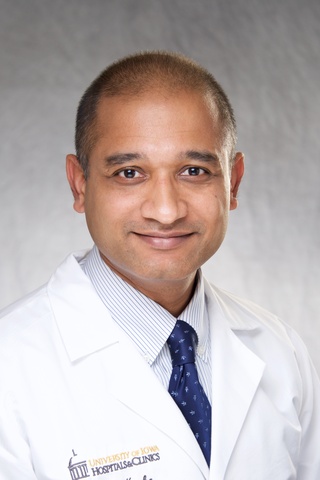 What is your hometown?
What is your hometown?

My parents live in Chennai in southern India. However, because of my father’s job as a coal-mining engineer, I grew up in Ranchi in eastern India, the hometown of MS Dhoni (cricket fans will know what I am talking about).
How/when did you become interested in science and/or medicine?
Two of my high school science teachers introduced me to the concept of scientific rigor – they demanded precise methodology beyond what is usually encountered in the high school setting. Later, the study of human physiology pressed those same buttons.
When did you join the University of Iowa faculty?
I was working in the intensive care unit (ICU) of a small rural hospital in South Africa, which is where my wife is from. We moved to Iowa to further my training, after which I joined the UI faculty in July 2009.
How or why did you choose to join the faculty at the University of Iowa?
During my training here, my wife and I realized that Iowa City was a good fit for us. We enjoyed the friendliness and kindness of the people here. The academic mentoring (formal and informal) I received at Iowa inspired me to stay. This ethos is the foundation of my day-to-day interaction with trainees and peers.
Is there a teacher or mentor who helped shape your career?
Dr. Michael Todd and Dr. Javier Campos were instrumental in guiding my early career. Dr. Todd reminded me of those science teachers – his tendency towards rigorous methodical analysis gave me a high standard to live up to. Dr. Campos provided me with opportunities to explore my academic interests that allowed me to mature professionally.
How do you see your faculty role impacting medicine and/or science?
I want to pass on this sense of keen scientific inquiry, which my mentors instilled in me. Asking questions is to be encouraged. Both the scientific knowledge base, as well as personal clinical abilities, develop further in this way.
What is the biggest change you've experienced in your field since you were a student?
The use of ultrasound technology at the point of care has become more commonplace. It has allowed for instant access to imaging that was previously only available in specialist laboratories. There is a much faster turnaround from identifying a problem, to implementation of therapy.
What one piece of advice would you give to today's students?
Through the inevitable highs and lows of medical training, remember that you’ve already proven yourself. Tenacity goes a long way. Don’t shy away from asking for help.
In what ways are you engaged in professional activities outside the University (i.e. population based research, mentoring high school students, sharing your leadership/ expertise with organizations or causes, speaking engagement off campus, etc.)?
I moderate workshops at the annual Thoracic Anesthesia Symposium. For the Society for Critical Care Medicine, I review abstracts for the annual meeting and have helped develop the Critical Care Medicine curriculum for medical students.
What are some of your outside (personal) interests?
I enjoy doing crossword puzzles with my 10-year-old daughter and playing with our chihuahua, Jack. I enjoy the outdoors, particularly running and swimming. Our family enjoys traveling, whether it’s to our countries of origin (India and South Africa) or within the United States, like Yellowstone National Park.
Learn more about Sundar Krishnan, MBBS.